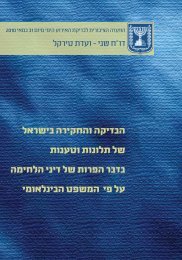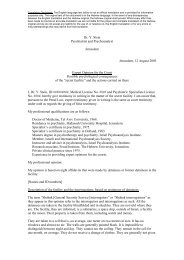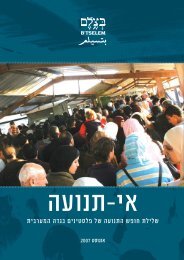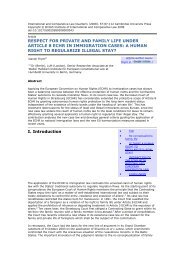HCJ 10650/03 Abu Gwella et. al v
HCJ 10650/03 Abu Gwella et. al v
HCJ 10650/03 Abu Gwella et. al v
Create successful ePaper yourself
Turn your PDF publications into a flip-book with our unique Google optimized e-Paper software.
At the end of June, the Committee’s chair announced that the vote in the Committee<br />
would take place the following day.<br />
As a result of the many references to the minutes of the hearing, they are attached<br />
her<strong>et</strong>o, marked P/39.<br />
The Committee’s vote<br />
85. On 30 July 20<strong>03</strong>, the Committee convened to vote on the sections of the bill and on<br />
certain amendments to it. Members wanted to raise objections, but the chair decided<br />
that there would not be any discussion on the objections. In his words:<br />
The majority here are co<strong>al</strong>ition members, and the co<strong>al</strong>ition<br />
intends to pass this bill as it is, without the objections.<br />
(Minutes of the hearing, page 3)<br />
86. Attorney Anna Schneider, the Kness<strong>et</strong>’s leg<strong>al</strong> advisor, and Attorney Frankel-Shor, the<br />
Committee’s leg<strong>al</strong> advisor, contended that the procedure is to hear the objections in<br />
the Committee at the time of the vote on the bill, and that it should be done that way.<br />
However, the leg<strong>al</strong> advisor stated that, in certain cases, reading of the objections is<br />
moved to the plenum, and that the chair has discr<strong>et</strong>ion in this matter. Attorney<br />
Schneider noted that it is significant wh<strong>et</strong>her the objections are substantive or<br />
technic<strong>al</strong>; in the former case, use of the Kness<strong>et</strong>’s norm<strong>al</strong> procedure increases in<br />
importance, and the objections should be debated prior to voting on the bill in<br />
committee.<br />
87. Notwithstanding these opinions, the chair decided not to consider the objections. The<br />
only concession the chair was willing to make in response to the vociferous opposition<br />
to his decision was to grant each of the members with objections to state the objection<br />
to the bill’s sections. In protest, representatives of the opposition left the committee<br />
room.<br />
88. In that the objections – like the propos<strong>al</strong> to amend the bill that the Committee’s leg<strong>al</strong><br />
advisor had laid on the table of the Kness<strong>et</strong> the day before – were not read, the<br />
Committee members were not presented the <strong>al</strong>ternative suggested in these propos<strong>al</strong>s,<br />
which was to add a sentence to the definitions section of the bill, stating that the law<br />
does not apply to children.<br />
89. As a result, the government proposed its own amendment, an addition to Section 3 –<br />
an unclear concluding clause stating that a permit to stay in Israel or a permit to reside<br />
in Israel can be given to avoid the separation of a child under age 12 from his parent<br />
lawfully residing in Israel. This amendment was added following the hearing in the<br />
33









